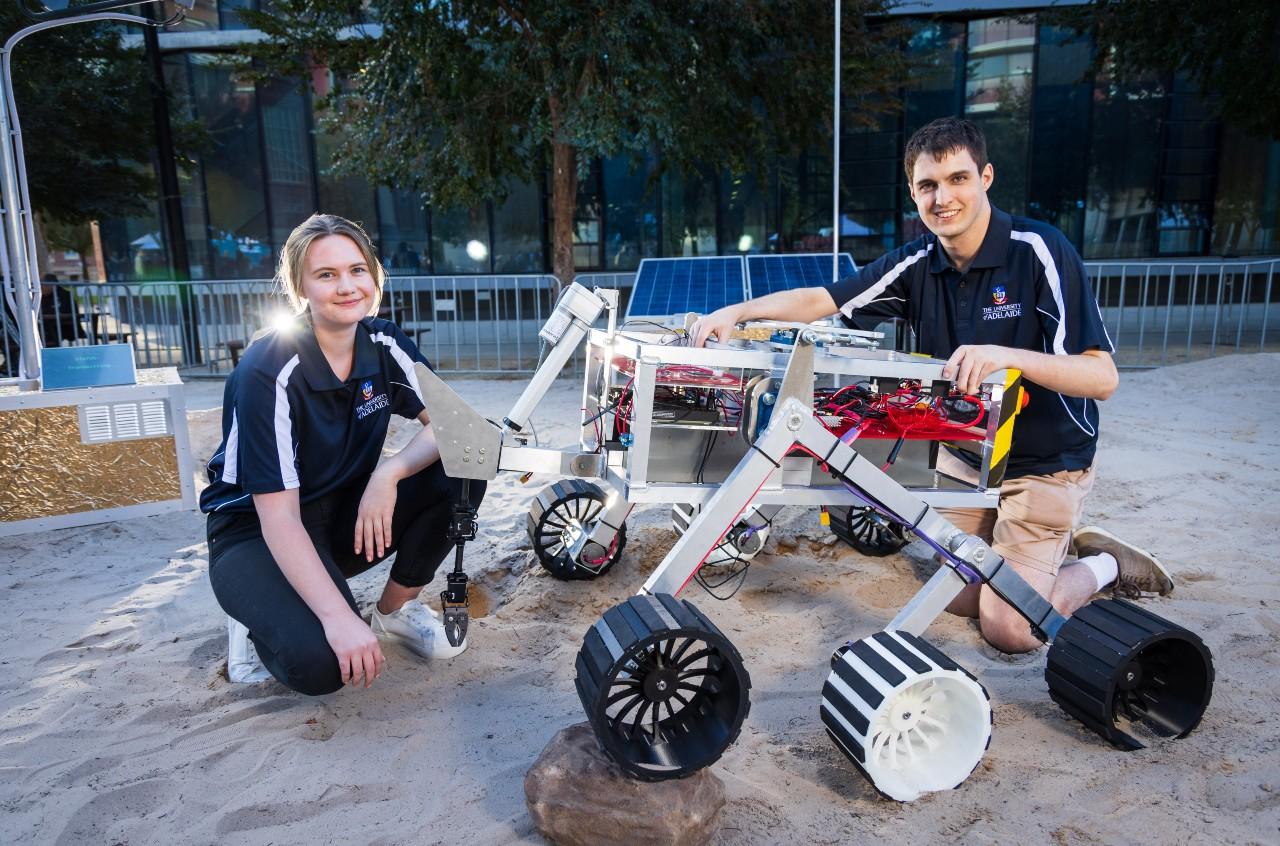Students’ lunar rovers go head-to-head

Abigail Sparnon, Bachelor of Mathematical and Computer Science and Henry Mellor, PhD Mechanical Engineering with the University of Adelaide's rover Lil' Gaz. Photo: James Elsby
This weekend teams of students from around the country will compete in the inaugural Australian Rover Challenge held at the University of Adelaide. Students will put their lunar rovers which they have designed and built themselves, to the test in a series of missions performed on a recreation of the surface of the Moon.
“For the first time in Australia, the global challenge to design and build a rover to compete in a simulated lunar mission is coming to North Terrace campus,” said the University of Adelaide’s Associate Professor John Culton who is Director of the Andy Thomas Centre for Space Resources.
“The Australian Rover Challenge will deliver a highly rewarding and globally unique challenge to students.
“The Challenge is all about developing the skillsets that are becoming increasingly needed as the new era of long-duration human operations in deep space unfolds.”
The University’s Maths Lawns will be transformed into a lunar landscape for the challenge, with sandy loam, rocks, craters, a life-sized space lander, satellites and other space props. Four different challenges will test the capabilities of the rovers. Rovers had to be built according to the competition rules no bigger than one and half metres in size so they fit on the three metre lander. Saturday’s challenges will be a post-landing task and lunar resources task.
“For the first time in Australia, the global challenge to design and build a rover to compete in a simulated lunar mission is coming to North Terrace campus."Associate Professor John Culton
“Teams will need to remotely drive their rovers off the lander then complete a task list to work towards establishing a remote mining operation,” said Associate Professor Culton.
“They will carry out a systems check on the lander, initiate a start-up protocol and relay information about any damage to the judges and then navigate to a supply cache while traversing obstacles and drops.
“The lunar resources task will test the rover’s ability to identify and extract resources from the site. The rover will need to extract a sample of frozen water from one of three sites and return it to the processing plant.”
The challenges recreate tasks which lunar rovers may face on real missions such as NASA’s next mission to the Moon in 2024.
Sunday’s challenge will include a lunar construction task, in which rovers will be awarded points for picking up and stacking bricks. The final autonomous task will test each rover’s ability to traverse challenging terrain while being controlled remotely by the operator using only vision from the rover’s camera.
In addition to a team from the University of Adelaide teams from Monash University and RMIT will compete. The teams will present their rover designs to industry professionals, academia and judges. Points will be awarded for each task as well as the team’s presentations and documentation of their rover.
The University of Adelaide team’s rover, named ‘Lil’ Gaz’, has been through rigorous designing, testing and construction to prepare it for the challenge.
“The Australian Rover Challenge gives our team the opportunity to put the skills we’ve developed during our courses into practice,” said Henry Mellor, team leader of the University of Adelaide’s Australian Rover Challenge team.
“Our rover’s robotic arm has six degrees of freedom so it’s ideal for Sunday’s lunar construction task in which it has to build sturdy structures. The precision and strength of the arm will allow us to build the structures without too much difficulty.”
The winner of the Australian Rover Challenge will take home a trophy made from discarded pieces of rover, built together by all of the competing teams.
This free event is open to anyone who would like to watch the Challenge: www.eventbrite.com.au
The Australian Rover Challenge is a partnership between the University of Adelaide and the South Australian Space Industry Centre, and is supported by the Australian Space Agency and the SmartSAT CRC, the Space Industry Association of Australia and the Australian Robotics and Automation Association. University teams from around Australia will be invited back to compete in the global competition. The University Rover Challenge series is staged in America, Canada, Europe and India.
Media Contacts:
Associate Professor John Culton, Director, Andy Thomas Centre for Space Resources, The University of Adelaide. Mobile: +61 (0)466 859 195, Email: john.culton@adelaide.edu.au
Crispin Savage, Senior Communications and Media Officer, The University of Adelaide. Mobile: +61 (0)481 912 465, Email: crispin.savage@adelaide.edu.au
